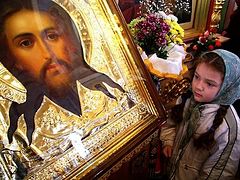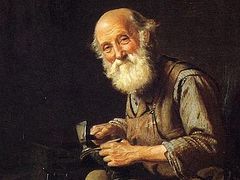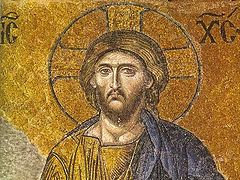In his wonderful book Mt. Athos Stories, the prominent Russian expert on religions and sects Alexander Dvorkin recounts an incident that stuck in his memory. The boat that was conveying the young Alexander to Holy Mount Athos met a ship on which a group of hired laborers were returning from Mt. Athos after two months’ work. Starving for booze and entertainment, the men were roaring with laughter, making a lot of noise, and singing obscene songs loudly. As soon as they saw a cruise ship sailing by with young women on its deck, the workers started whistling and shouting indecent words. Dvorkin wrote that that sorry sight, namely the wild outburst of human passions which had torn themselves away from the spiritual protection of the holy place, much grieved his soul that had found God shortly before the incident.
This story provides much food for thought. Several weeks have passed since the feast of the Radiant Resurrection of Christ. The new joy of the Paschal night is slowly fading away, and the treasured memories of the Passion of Christ and His Resurrection are hidden deep in our hearts. The festivities have yielded to work days—an endless succession of monotonous days which, however, are important to us as we are reflected in them.
What do we look like after our Lenten pilgrimage? Are we like Moses who descended from Mount Sinai after his forty days of fasting, when his face was reflecting the brilliant light of God? Or we are like the above-mentioned hired workers, overcome by their carnal passions? Each one of us will have his own answer… The Church is aware of our human weakness, so it sets our minds on things above in today’s epistle, reminding us about the miracles wrought by the power of the Risen Christ. These miracles demonstrate us that the Savior after His ministry on earth continues to heal the sick and raise the dead, acting through His Church and by the hands of the apostles and other saints. The light of Christ’s Resurrection continues to shine in the Church, His Body, and this reading from the Acts of Apostles draws our attention to this light.
And it came to pass, as Peter passed throughout all quarters, he came down also to the saints which dwelt at Lydda. And there he found a certain man named Aeneas, which had kept his bed eight years, and was sick of the palsy. And Peter said unto him, Aeneas, Jesus Christ maketh thee whole: arise, and make thy bed. And he arose immediately. And all that dwelt at Lydda and Saron saw him, and turned to the Lord (Acts 9:32-35).
Dear brothers and sisters, let us take note of the fact that it was not stated whether Aeneas was a Christian or not. He probably wasn’t because such facts are always stated precisely in the Bible. For example, Tabitha (we will talk about her later) is called a disciple. But here nothing is said about Aeneas’s faith in Christ.
Brothers and sisters, this fact proclaims the great and delightful truth that God pours out His grace upon everybody! How often we, Orthodox Christians, forget it and claim the monopoly on God’s help! In truth very many believe that the Creator doesn’t take care of people outside the Orthodox Church. They sincerely think that there are no miracles, no prayers outside the Church, and the “morals” stem from the fallen nature there. In reality, the Holy Scriptures clearly say that The wind bloweth where it listeth (Jn. 3:8) and God is no Respecter of persons: but in every nation he that feareth Him, and worketh righteousness, is accepted with Him (Acts 10:34-35). True, full and ultimate salvation, or theosis, is possible only in the Church. However, we should not forget that there are billions people living outside the Church, and the Lord takes care of them as He takes care of us, or even more because we are already in His fold, while those people are like sheep that have gone astray. So even outside the Church God seeks man and man seeks God.
Let us take one important detail into consideration. Peter, passing throughout all quarters, found saints (Christians) as well as “a man”. Aeneas couldn’t be called a “saint” as he was not a member of the Church. But he was a man, and this means a lot, brothers and sisters. The high and noble rank of human beings obliges us to possess some inner traits that make the human race different from animals. What are they?
For example, the search for God; the longing for perfection; loving beautiful things; recognizing the existence of the spiritual world, contact with which is more important than the satisfaction of material needs; distinguishing between what is sacred and what is common; caring for our environment and being responsible for its state. In a word, these are universal human virtues with which we are born and which each one of us is expected to practice during his life (of course, if he is not losing all semblance of being human).
Do many modern people possess these traits and qualities? Today’s post-Christian world is losing its humanity very fast. Things that were disdained for thousands of years by all the nations in our days appear on magazine covers. Nowadays newspapers carry screaming headlines on subjects that were once discussed only in a whisper. Today people already call black white and will begin to call white black soon. More and more people prefer to live without the moral code that is common for whole of mankind; the human race is losing its humanity. In the twenty-first century it is much more difficult to explain to people the things that were crystal clear for hundreds of generations before us—for example, why there cannot be “same-sex couples”, why abortion is a sin, and why it is too early for six-year-old children to be sexually active.
Thus, we see that Aeneas deserves to be called a man. But any man living on our planet (even if he is the best in the world) is a fallen creature. Aeneas had palsy. In him we can see the whole of mankind, which was spiritually paralyzed and needed the Savior. I have no man (Jn. 5:7), said another paralyzed man in the Gospel, who lay in a porch of the healing pool by the sheep market. He had no man, and indeed there was no man and there even could be no man. For the eternal salvation is the work of God rather than the work of men. Only Baron Munchausen1 pulled himself out of the mire by his own hair. It was not until God became man that the healing of mankind, which was paralyzed by sin, became possible. That is why Peter said to the paralyzed man, Aeneas, Jesus Christ maketh thee whole! The times of ignorance and spiritual paralysis were over, and it was time for mankind “to rise, to take up its bed and walk home”—that is, to return to its heavenly fatherland, combining its efforts with God’s help.
And all that dwelt at Lydda and Saron saw him, and turned to the Lord. Having learned about the miracle, the inhabitants of these cities neither followed him everywhere, nor made a “personality cult”, nor pestered him asking about the date of the end of the world. Rather, they turned to the Lord. It is amazing that ancient pagans sometimes had a much more reasonable religious consciousness than many modern Christians. The residents of Lydda and Saron immediately realized that the human heart needed the Lord, not Peter or Paul. Peter and Paul were just servants of God.
The residents of Joppa set another good example of spiritual discernment by sending for Peter and imploring him to come and pray for Tabitha’s return to life as all loved her for her acts of charity.
Now there was at Joppa a certain disciple named Tabitha, which by interpretation is called Dorcas: this woman was full of good works and almsdeeds which she did. And it came to pass in those days, that she was sick, and died: whom when they had washed, they laid her in an upper chamber. And forasmuch as Lydda was nigh to Joppa, and the disciples had heard that Peter was there, they sent unto him two men, desiring him that he would not delay to come to them. Then Peter arose and went with them. When he was come, they brought him into the upper chamber: and all the widows stood by him weeping, and shewing the coats and garments which Dorcas made, while she was with them. But Peter put them all forth, and kneeled down, and prayed; and turning him to the body said, Tabitha, arise. And she opened her eyes: and when she saw Peter, she sat up. And he gave her his hand, and lifted her up, and when he had called the saints and widows, presented her alive. And it was known throughout all Joppa; and many believed in the Lord (Acts 9:36-42).
Let us take notice of the fact that Peter hadn’t raised anybody from the dead before. But the disciples did know that Christ had done this. Since Peter healed Aeneas in the Name of Christ, the disciples were confident that He Who had hearkened to Peter praying for Aeneas would hearken to him praying for Tabitha.
Indeed one must have a great, strong faith to approach an apostle and ask him… to raise someone from the dead through his prayers! Such was the faith of the early Church. It was bold, deep, firm faith, free from legalism, stagnation and religious pettiness. A faith that changed the world, a faith that heals the sick and brings the dead back to life.
Peter who was ardent by nature responded to this faith. So he came to them, knelt down and prayed for Tabitha’s soul. The apostle’s fervor united with the Joppa community’s living flame of bold faith—and their joint prayer worked wonders! For love triumphs over death, and the human faith can be such that it makes the Lord Himself marvel. Can the Heavenly Father ignore this faith of His children?
But the following question arises. Didn’t Apostle Peter and the other disciples understand that Tabitha was with the Lord in bliss after her death? Of course, they were aware of this. Then why did they want her to come back to this life, which is filled with sorrows and infirmities? Why did Peter pray for Tabitha’s resurrection? Why not leave her with the Savior?
Because in some cases serving one’s neighbors on earth is more important than seeing the Face of Christ in Paradise. Besides, a true believer sees the Face of the Almighty already in this life—in each of his brothers and sisters. The Church Fathers used to say: “he who has seen his neighbor has seen God”. Tabitha was resurrected to continue her labor of love and grow in the knowledge of God. She was brought back to life to become closer to Christ and to say to all of us that one triumphs over death by serving others in the Name of Christ.
While I was reflecting on this epistle, the following image came into my head. When travelers stop for the night in the wilderness, they build a fire in order to frighten the wild animals off and feel warm. As soon as they hear rustling or a breath of cold wind, they huddle together closer to the fire. Likewise, dear brothers and sisters, carnal passions are stealing upon us after the period of fasting, and the spiritual paralysis and “stony lack of feeling” [mentioned in the Prayer of St. John Chrysostom among the evening prayers in Church Slavonic] is in the air. Like those travelers at night, we should draw closer to the fire—the unquenchable and “ever-burning bush” of the Paschal joy that was kindled 2,000 years ago both on earth and in heaven. And this epistle brings us the warmth of that flame, reminding us about the miracles wrought by the power of the Risen Lord. Let us warm ourselves for a while. We are to make a journey. Pentecost, the Apostles’ Fast, the Dormition will lead us up the ladder of salvation—the annual liturgical cycle.
May the bright Paschal grace (whose breathing has been brought to us by this epistle from the Acts of Apostles) illuminate our path; and may we walk this path to the end with the help of the Lord Jesus Christ, Who is Risen from the Dead, Who is our Pascha, our joy and salvation. May the power of His Resurrection give us strength in all our ways.
Christ Is Risen!





